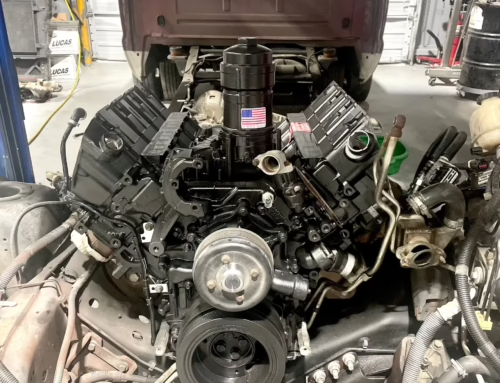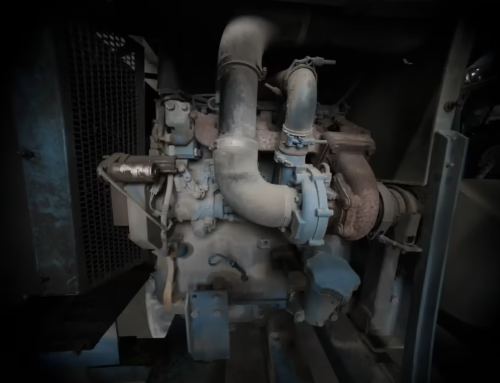Synthetic VS Conventional Oils – Which is better for heavy duty vehicles?
When it comes to lubricating the engines of heavy-duty trucks, the choice between synthetic oil and conventional oil is important. Both have their pros and cons, but which one is the right fit for your rig? We’re here to break down the differences, benefits, and considerations so you can make the most informed decision. After all, your engine’s lifespan depends on proper lubrication and care. Rhino Truck Lube Centres will offer all you need to know to decide what oils are best for your vehicle.
What is Conventional Oil?
Conventional oil, sometimes referred to as mineral oil, is derived from crude oil that undergoes refining processes to remove impurities. This type of oil has been the traditional go-to for decades, providing engines with decent lubrication at a lower cost. While conventional oil works well for engines that aren’t constantly under extreme conditions, heavy-duty engines often push beyond these limits.
- Advantages of Conventional Oil:some text
- Lower upfront cost
- Widely available
- Ideal for older engines or those with high mileage
- Drawbacks:some text
- Breaks down faster under high heat
- Requires more frequent oil changes
- Can form sludge if not replaced on time
What is Synthetic Oil?
Synthetic oils are man-made, developed with chemical compounds and high-quality base oils. These lubricants are designed to offer superior performance, especially under extreme conditions, making them ideal for long-haul trucks and other heavy-duty applications.
- Advantages of Synthetic Oil:some text
- Superior heat resistance
- Extended oil change intervals
- Reduces engine wear with enhanced lubrication properties
- Better cold-start performance
- Drawbacks:some text
- Higher upfront cost
- May be unnecessary for older engines not designed for synthetic oil
- Requires strict monitoring during oil changes to avoid overextending intervals
How Do They Differ in Heavy-Duty Applications?
In heavy-duty applications, the choice between synthetic and conventional oil can have significant implications on the performance and maintenance of machinery. Synthetic oils generally offer enhanced protection and performance under extreme conditions compared to conventional oils, which are derived from refined crude oil. This distinction influences maintenance schedules, engine efficiency, and overall operational costs in industries reliant on heavy-duty equipment.
Temperature Resistance & Engine Wear
Synthetic oils perform better under extreme temperatures. Heavy-duty trucks frequently run hot, especially when towing or climbing steep grades. Synthetic oil’s oxidation resistance keeps it from breaking down, ensuring smooth engine function over long hauls. Conventional oil, by contrast, tends to degrade more rapidly under these conditions, increasing the risk of sludge formation in the engine.
Fuel Economy
Many fleet operators see improved fuel efficiency when switching to synthetic oil. Because it flows more freely, synthetic oil reduces internal friction, which means the engine doesn’t have to work as hard. This can result in better fuel per gallon, saving money in the long run—particularly important for businesses operating multiple trucks.
Cold Weather Performance
If you’re operating in colder climates like Woodstock or Moncton, synthetic oil offers a major advantage. It maintains viscosity better in freezing temperatures, ensuring quick starts even in the depths of winter. Conventional oils tend to thicken, leading to harder starts and increased wear during those crucial moments when the engine first fires up.
When to Choose Synthetic Over Conventional Oil
Extended Oil Change Intervals: Trucks that cover long distances without regular access to service stations benefit from synthetic oil’s longer lifespan. This helps avoid downtime and keeps operations running smoothly.
High Mileage and Heavy Loads: Heavy-duty vehicles operating under continuous strain—whether from towing or steep inclines—should consider synthetic oil. It’s more stable under high pressures, reducing the risk of breakdowns.
Extreme Weather Conditions: If your fleet operates in extremely hot or cold climates, synthetic oil is the better choice. It handles temperature fluctuations better, ensuring reliable performance in all seasons.
Engine Longevity: If you want to extend the lifespan of your engine, synthetic oil’s superior wear protection makes it a smart investment. Engines running on synthetic oil tend to stay cleaner, with fewer contaminants clogging vital components.
The Case for Conventional Oil
Although synthetic oils offer many advantages, they aren’t always necessary. If your trucks are older models with high mileage or if they don’t operate under extreme conditions, conventional oil may still be sufficient. Some engines are also better suited to mineral oil, especially if they’ve always run on it.
Additionally, the lower upfront cost of conventional oil appeals to operators managing smaller fleets or trucks used primarily for local routes. If these trucks are serviced regularly and don’t push the engine to its limits, conventional oil remains a viable option.
Which One Should You Choose?
Ultimately, the choice comes down to application and budget. If you’re looking for cost savings on routine maintenance, conventional oil might be sufficient. However, for long-haul operations, towing-heavy applications, or extreme weather conditions, synthetic oil provides better protection and longer intervals between oil changes—saving money in the long run.
Pick the Oil That Powers Heavy-Duty Success
Rhino Truck Lube Centres knows that when it comes to keeping your heavy-duty truck in top shape, oil selection is critical. Synthetic oil offers superior performance under extreme conditions, longer service intervals, and better engine protection. Conventional oil, while cheaper, requires more frequent changes and may struggle under heavy loads or extreme weather. For fleet managers in places like Moncton, Dartmouth, and Woodstock, synthetic oil is often worth the investment, especially if uptime and performance are priorities. To learn more about the prices of lubricants, check out our article on fluid costs & benefits.




